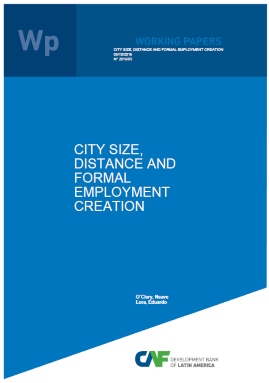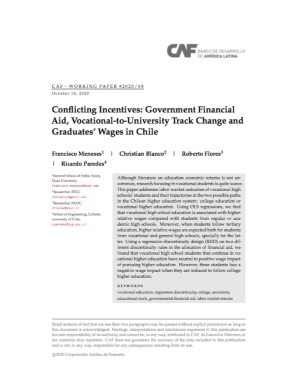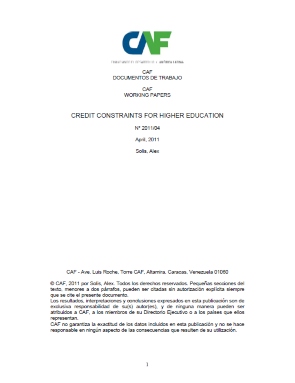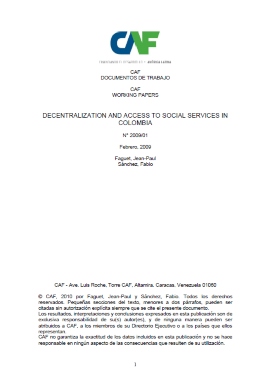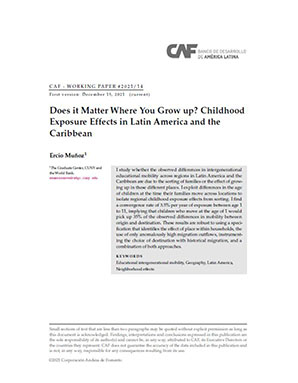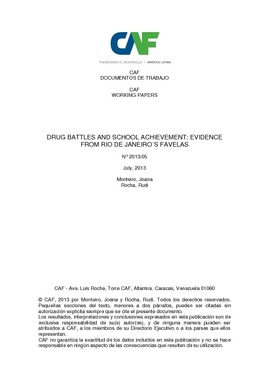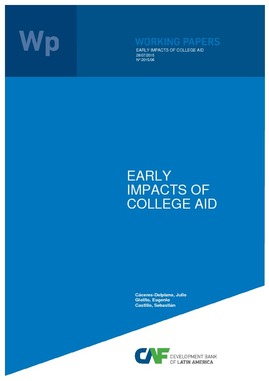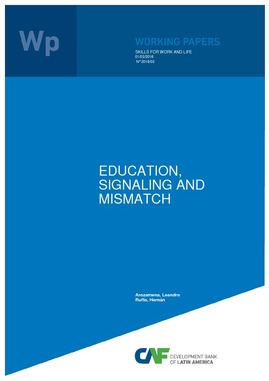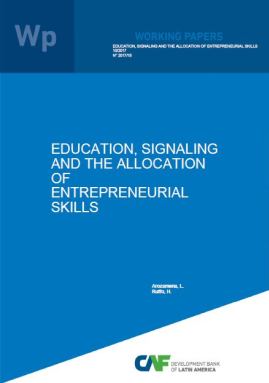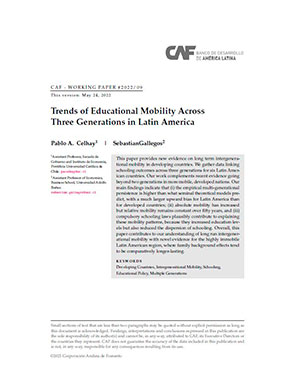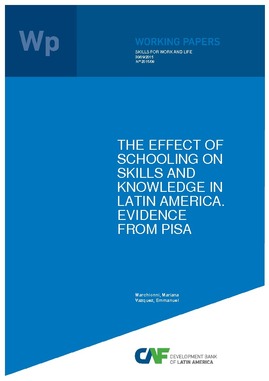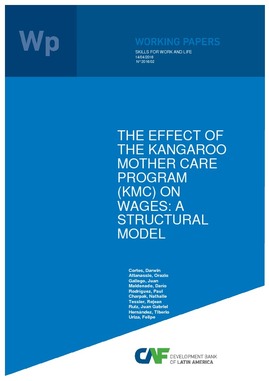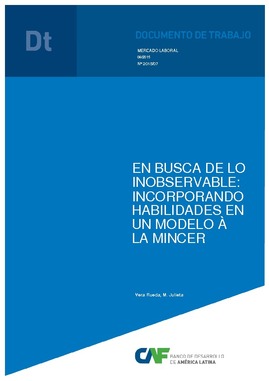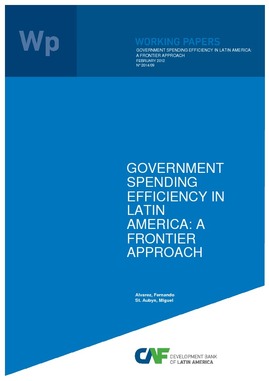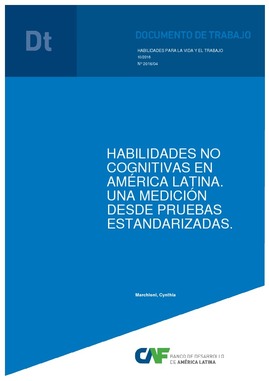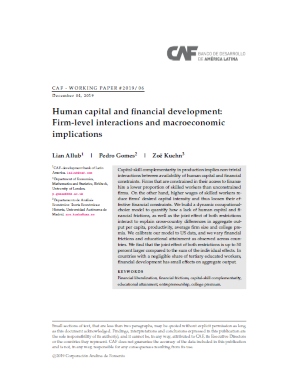Listar6.1 Documentos de trabajo en investigación socioeconómica por tema "Educación"
Mostrando ítems 1-20 de 54
-
Benefits to Elite Schools and the Expected Returns to Education: Evidence from Mexico City
(CAF; Buenos Aires, 2017-03-10)We exploit data on the future earnings students at high school completion expect to receive with and without a college education, together with information on learning achievement and college outcomes, to study the benefits ... -
City Size, Distance and Formal Employment Creation
(CAF; Caracas, 2016-10-09)Cities thrive through the diversity of their occupants because the availability of complementary skills enables firms in the formal sector to grow, delivering increasingly sophisticated products and services. The appearance ... -
Conflicting Incentives: Government Financial Aid, Vocational-to-University Track Change and Graduates’ Wages in Chile
(CAF; Caracas, 2020-10-16)Although literature on education economic returns is not un- common, research focusing in vocational students is quite scarce. This paper addresses labor market outcomes of vocational high schools’ students and their ... -
Credit Constraints for Higher Education
(CAF; Caracas, 2011)This paper addresses the importance of credit constraints explaining the gap on college enrollment between students coming from rich and poor families. Measuring the effect of credit constraints on college enrollment is ... -
Decentralization and Access to Social Services in Colombia
(CAF; Caracas, 2009)A central claim in favor of decentralization is that it will improve access to public services, but few studies examine this question empirically. This paper explores the effects of decentralization to access to health and ... -
Diferencias en la calidad de la educación e ineficiencia: un análisis basado en el método de frontera estocástica.
(CAF; Caracas, 2012)En este trabajo se emplea información acerca del desempeño escolar a nivel de establecimiento educativo para Chile y Perú con el objeto de estudiar la eficiencia en la provisión de servicios educación en la dimensión de ... -
Does it Matter Where You Grow up? Childhood Exposure Effects in Latin America and the Caribbean
(CAF; Caracas, 2021-12-15)I study whether the observed differences in intergenerational educational mobility across regions in Latin America and the Caribbean are due to the sorting of families or the effect of grow ing up in these different places. ... -
Drug battles and school achievement: evidence from Rio de Janeiro's favelas
(CAF; Caracas, 2013)This paper examines the effects of armed conflicts between drug gangs in Rio de Janeiro's favelas on student achievement. To identify the causal effect of violence on education, we explore variation in violence that occurs ... -
Early Impacts of College Aid
(CAF, 2015-07-28)We analyze the impact of an expansion in government-guaranteed credit for higher education in Chile on a sample of elementary and high school students. Using students who had an alternative source of funding as a control ... -
Education, Signaling and Mismatch
(CAF; Buenos Aires, 2016-06)We assess the importance education as a signal of workers skills and the e¤ects of poor signaling quality on labor market outcomes. We do so by merging a frictional labor market model with a signaling setup where there is ... -
Education, signaling and the allocation of entrepreneurial skills
(CAF; Buenos Aires, 2017-10-02)We assess the allocative importance of education when workers can choose to self-employ. To do so, we build a model combining educational choices with the labor market and selfemployment. Education can increase workers' ... -
Educational Mobility Across Three Generations in Latin American Countries
(CAF; Caracas, 2023-07-27)This paper presents new evidence on educational mobility across three generations in six Latin American countries (LAC). Combining survey information with national census data we build a data set with 50,000 triads of ... -
The Effect of Schooling on Skills and Knowledge in Latin America. Evidence from PISA
(CAF, 2015-09-30)In this paper we estimate the causal effect of an extra year of schooling on mathematics skills and knowledge for the eight Latin American countries (Argentina, Brazil, Chile, Colombia, Costa Rica, Mexico, Peru and Uruguay) ... -
The Effect of the Kangaroo Mother Care Program (KMC) on Wages: A structural Model
(CAF; Caracas, 2016-04-14)In this paper we analyze the relationship between skills and some outcomes later in life for a population of premature children. Pretreatment skills and characteristics are good predictors of childhood and adulthood skills ... -
En busca de lo inobservable: incorporando habilidades en un modelo à la Mincer
(CAF; Buenos Aires, 2015-07)En este trabajo se busca replicar el modelo básico de Jacob Mincer (1974), con el objeto de encontrar un mejor estimador del efecto de la educación sobre los ingresos, controlando no solo por variables observables sino ... -
Expectations about Returns to Education. The Role of Parental and Youths’ Characteristics
(CAF; Caracas, 2022-01-17)Investing in human capital requires, among others, access and capacity to process information. This paper focuses on understanding the role of expected returns to education in determining schooling decisions. Using data ... -
El Fenómeno de los NiNis en América Latina
(CAF; Buenos Aires, 2016-12-30)En los últimos años, y en todos los países de la región, se ha ido incrementando la preocupación por la situación de los jóvenes que ni se encuentran insertos en el sistema educativo ni se han integrado al mercado laboral ... -
Government Spending Efficiency in Latin America: A Frontier Approach
(CAF, 2014-09)Government spending efficiency in providing education and health is evaluated across countries of the world, with a special emphasis on Latin American countries. Using stochastic frontier and data envelopment analysis, it ... -
Habilidades no cognitivas en América Latina. Una medición desde pruebas estandarizadas.
(CAF, 2016-08-31)Medir habilidades es complejo, pues son inobservables. Este problema es particularmente importante en la medición de habilidades no cognitivas, donde usualmente se emplean métodos basados en el auto-reporte. Como alternativa ... -
Human Capital and Financial Development: Firm-Level Interactions and Macroeconomic Implications
(CAF; Caracas, 2019-12-04)Capital-skill complementarity in production implies non-trivial interactions between availability of human capital and financial constraints. Firms that are constrained in their access to finance hire a lower proportion ...



